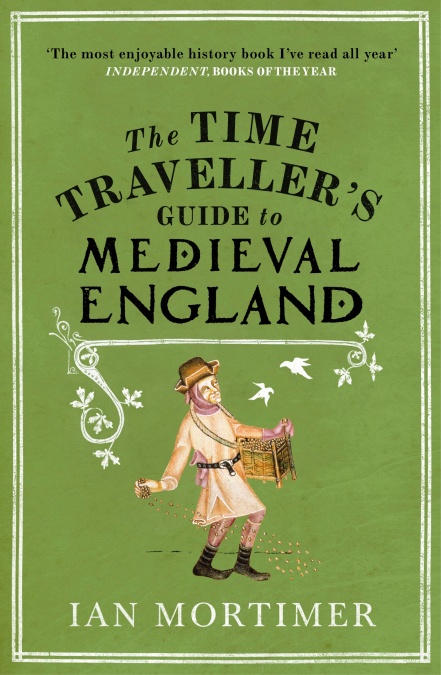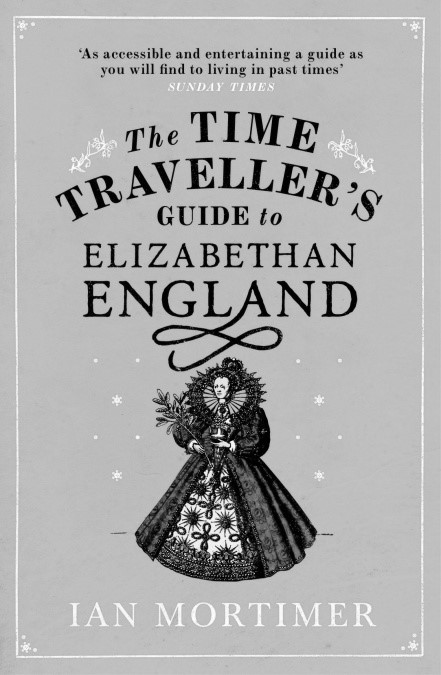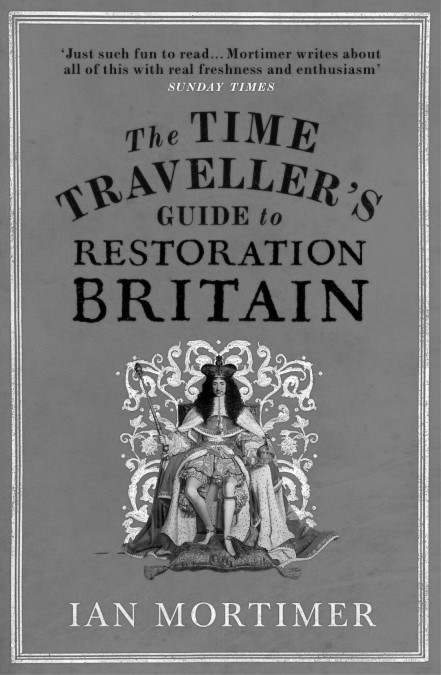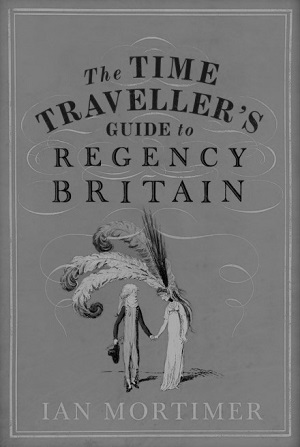|
The Time Traveller's Guide to Promotional article Imagine you could travel in time. Imagine you could visit the fourteenth century... Cart wheels rumble by on uneven stones. A man calls for you to mind out of his way as he approaches, holding the bridle of a sumpter horse which is pulling a heavily laden cart to a nearby fair. He smiles a bearded smile: it is a good day. Behind him people are leading their packhorses and driving livestock along the road - sheep, cattle and goats, even pigs. Every so often a cow strays towards the grass in a fallow field and the boy tending the animals has to run after it and whip it back into line. Women dressed in long kirtles and wimples and carrying baskets of eggs before them. Here comes a Dominican friar in his black habit; here a troup of minstrels and acrobats. They are all making their way into the city for the fair - one of the great gatherings of the year - an opportunity to buy everything they might need and to see all the luxuries a rich man might buy, from silks to cinnamon, from pomegranates to paper. There too they can see actors and performers, meet people from far afield and listen to their news. They will drink and laugh in the rowdy taverns, and pick up meat pies from one of the city's cookshops. Look carefully at the faces. Have you noticed how young these people are? Half of them - half of the entire population - are below the age of twenty-one. Think about that; in modern England, half the population is thirty-nine or more. In making life decisions, medieval people have eighteen years less experience to draw on. Men conscripted into a medieval army have to put their trust in commanders who might be still in their teens. Positions of civic responsibility are often given to men of just twenty-one. Men over sixty are few and far between, and they are generally regarded as laughable figures, being too weak to be 'real men'. Society is younger, more violent, more passionate, and altogether more dangerous than anything you have ever experienced. Dangerous - yes. When travelling, most men wear swords. They know how to use them too, and how to shoot a longbow. True, when they come to a town they will have to remove their weapons, but still they carry knives on their belts, and it is easy to have a dagger concealed about your person. And if someone does pull a knife on you, there is very little chance that they will pay a penalty for your murder, unless they are caught red-handed. There are no detectives in medieval England. If you have money in your purse, or you are a young woman, you are in constant danger. There is nothing chauvinistic about keeping a young woman indoors and not allowing her to go out unaccompanied; it is simply the responsible thing for a father or husband to do. If she were to be raped and get pregnant, then the law would declare that she had allowed herself to be seduced. It commonly believed that a woman only falls pregnant if she enjoys the sex. So, life is very different. The people are more dangerous, more threatening. Their passions are assuaged by swordplay, wrestling and (for the aristocracy) jousting and hunting. They love the sight of blood, whether it be images of Christ bleeding on the cross or the sight of bloody meat in the market. They enjoy seeing savage dogs set against tethered animals - bulls and bears draw the biggest crowds. A great cheer goes up when a dog tears off a bear's ear or has its back broken with a blow of its paw. Cock-fighting is a children's game. Football is so violent that it is illegal in many towns. Violence permeates the whole of society, from the committing of crimes to the punishing of them. If you cross London Bridge and see half of a bloody rib cage with a lung and entrails hanging out of it, and an arm attached - that is all that remains of a man who has been hanged and quartered for treason. Sometimes traitors are made to watch their own eviscerated entrails being burnt in front of them, before they are killed. Let no one ever again tell you that we are all much the same - that we in the modern world are no different from medieval people. Medieval society lives side by side with brutality and hardship in ways we cannot even begin to appreciate. People still starve to death in fourteenth-century England. Children especially die during famines, weakened by a poor diet so that they have no resistance to any diseases. Two harvest failures in a row can wipe out a whole community, leaving men and women scrabbling around in their sodden fields for weeds. Death is a constant feature of their lives. Women run a high risk of death in childbirth. Most children do not live to adulthood: many die in their first year of life. With the gallows in the county town, and the war in France claiming many men's lives, and the harvest rotting in the fields, the violence of society is just a sign of its desperation. Then you have the Great Plague of 1348, otherwise known as the Black Death. It is without doubt the most catastrophic event in European history. Consider this: in the First World War, about seven per cent of the adult male population of Great Britain is killed over the course of four years. In the Great Plague, between thirty-five and forty-five per cent of the entire population is wiped out in just nine months. Mothers stare helplessly in horrified anguish at their screaming, feverish children - the suppurating buboes in their groins being a sure sign of their impending deaths. Husbands must bury their dead children's and wives' plague-corrupted bodies with their own hands. You will see corpses just lying in the middle of the highway. Thousands of villages are left empty. To say that sixty per cent of the people survive is missing the point. Society is turned upside down. Peasants flee their manors. Men begin to question God's plan for Mankind. Whereas before 1348 it is thought that diseases have a divine origin, and that such suffering is a way to heavenly salvation, after 1348 many people believe that God has turned against them. How can God be acting mercifully when he inflicts an agonising death on the innocent as well as the guilty? Before you run back to you time machine, screaming that you want to return to the modern world, hang on. Amidst all this misery, violence and suffering there is beauty, wit, ingenuity, goodwill, sophistication, courage and cultivation. The duke of Lancaster, one of the century's greatest war leaders, writes a book declaring that his greatest pleasures include smelling roses and lily of the valley at dusk, and eating salmon in piquant sauces (as well as wearing garters and seducing peasant girls). Stop by a country manor of a summer's evening after the harvest is done, and watch the men and women joyfully feasting on white bread, cheese and bacon, drinking good ale and 'carolling' - dancing and singing in a group - to the merry pipes and drums. Spend some time in the shops of goldsmiths and you will see the most exquisite workmanship. Listen to the bells of new-fangled clocks ringing out across the vineyards of an abbey. And look at the cathedrals, abbeys, and parish churches with soaring vaults, wonderful paintings and stained glass scenes of spiritual passion. Listen to the angelic music, the song of the human soul. And as for the new stone bridges, the schools, the colleges, the noble castles, and the manor houses with magnificent halls up sixty feet high hung with tapestries, feather-beds and lavender scented pillows, you have to admit that this is truly a sophisticated and highly cultivated kingdom. If you were to stay a year in the fourteenth century, what would be your favourite memory? Perhaps picking the tender pieces of roast swan or lark out of a subtly aromatic spiced sauce? Maybe watching the political elite don armour and joust against each other, trying to humiliate their opponents and prove themselves worthy of public respect? Perhaps listening to Geoffrey Chaucer reading some of his own brilliant poems as you sit by a fireside in a chamber with other esquires and gentlemen of the royal household? Or perhaps it would be simply watching a countrywoman in her long red kirtle, wimple and apron as she sweeps the yard of her house. She has already washed the cooking pots, bowls and ladle after the late-morning dinner. She has polished the silver spoons and set them back on the aumbry in the hall. She and her maids have scrubbed the white linen tablecloth, the linen sheets and her children's shirts and chemises in a large tub in the yard, rubbing them hard in diluted caustic liquid soap. Next she will give the baby a bath in warm water and brush down the family's tunics and pack each garment away carefully in a chest. And to think that after all this, in six hundred years' time she and everyone else of her time will be mocked in popular culture - the very word 'medieval' representing what is cruel, unkempt and dirty. You have to admire these people. All that washing and cleaning is just part of that woman's work. She will have to help with the harvest, weave her own cloth, make her own clothes, attend sick members of the community, breastfeed and tend her babies and cook every meal for a family of perhaps six or seven children - depending on how many have died in infancy. She will have to attend church and walk or ride to market, perhaps as far as five or six miles in each direction. And it is all carried out against a backdrop of social hardship, harvest failure, disease, violence and uncertain justice. As for her husband, if he is still alive, his time is spent on the manor, working in the fields, or fighting in the king's wars. And that last duty is nothing to be scoffed at. To fight in a medieval battle is to face the naked challenge of man's utter brutality to man. The enemy will think nothing of cutting his throat if he is left wounded on the battlefield. So, do you really want to travel in time? Perhaps not. It is far safer just to read this book. But what is important is to remember that this is not some fiction. People once really lived like this. Nor is this a history book intellectually structured around some ancient document. It is history written from the human perspective of what it is like to be alive: a chapter in the biography of Mankind. If you believe that the ultimate purpose of history is to see humanity in relation to time - not just in the superficial mirror of the present moment - then this book will allow you to juxtapose the past with the present. And if you always found history at school too rigid, chained down by dates and facts, then rest assured. In this book, history is set free. Ian Mortimer, 2008 |



